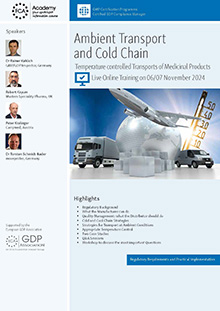GDP: What is a Pre-Wholesaler?

Recommendation
6/7 November 2024
Temperature controlled Transports of Medicinal Products
The definition for "pre-wholesale" is neither present in the EU GDP guidelines nor in the GMP requirements from Eudralex. The term has first arisen in a decision of the EU Commission in the course of a merger between Alliance Boots and ANZAG (2 wholesalers). At that time, the question of a monopolistic situation with regard to the business area pre-wholesale was addressed: "Pre-wholesaling is the provision of logistical services to pharmaceutical manufacturers, mainly consisting in the warehousing and transportation of pharmaceutical products from the manufacturer to wholesalers, hospitals and, in some instances, to pharmacies. The suppliers of pre-wholesale services do not take title to the pharmaceutical products they are storing and ownership remains with the manufacturer until delivery. Pre-wholesalers do not have a customer relationship with the intended recipient of the products but with the manufacturers who pay a fee or commission for the service. (…) Pre-wholesaling services differ from wholesaling in that they are services provided to the manufacturers and do not concern the purchase and sale of pharmaceuticals. Pre-wholesaling also differs from wider logistics and transportation services because pre-wholesaling requires sector-specific knowledge, and the providers need a wholesale license as well as a license for the premises where the pharmaceuticals are stored (warehousing)."(1)
Intermediaries i.e. brokers are thus defined by the fact that they deal with medicinal products without having any physical access to them, whereas pre-wholesalers do essentially the opposite: they have physical access to the goods without any property title or titles to purchase or sell the goods. Pre-wholesaling is no normal transport service as the pre-wholesaler also stores, takes individual packages from the stocks i.e. commissions, compiles shipments and transports them according to the customers' orders.
In accordance with the German Medicines Act (AMG), no GDP certificate is issued for that. Corresponding to the definition of the term "wholesale" in the German Medicines Act, the granting of a wholesale trade authorisation requires the will to trade and thus the ownership of the medicinal products. §4 (22) of AMG states: Wholesaling of medicinal products includes each professional activity exercised for the purpose of trading: acquiring, storing, dispensing or exporting medicinal products …."(2). From the German perspective though, a pre-wholesaler is a formally external warehouse for the manufacturer who acts for him within a GDP contract. This leads to the necessity to have an adequate contract and to inform the regulatory authority of the external warehouse. Inspections can therefore be performed. In Germany, the competent authorities do not generally issue an authorisation for pre-wholesalers (i.e. no GDP certificate) with reference to §4 (22) of AMG. But this is not completely true because some pre-wholesalers are divisions within one wholesaling company and they succeed in having a GDP inspection be performed and getting a certificate.
So there is a divergence between EU and German law. According to the EU-GDP guidelines, the pre-wholesaling activity is sufficient to generate the need to have a GDP certificate. According to the introduction of Article 1 § 17 of Directive 2001/83/EG, wholesale distribution of medicinal products is: "All activities consisting of procuring, holding, supplying or exporting medicinal products, apart from supplying medicinal products to the public". In other EU Member States and also in Switzerland, pre-wholesalers at least partly receive certificates.
Regardless of that, all responsibilities have to be clarified.
(1) Source: Case No COMP/M.6044 -ALLIANCE BOOTS/ANDREAE-NORIS ZAHN. In electronic form on the EUR-Lex website under document number 32010M6044
(2) This has been explicitly confirmed by the German regulatory authorities in the context of a ZLG Q&A Paper on GDP.
Related GMP News
GMP Conferences by Topics
- General Quality Assurance and GMP Compliance Topics
- Hygiene
- General Microbiology Topics
- Regulatory Affairs
- Development
- General Analytics Topics
- Good Distribution Practice
- Sterile Manufacturing
- Computer Validation
- General Qualification/Validation Topics
- General Engineering Topics
- APIs/Excipients
- GMP Basic Training Courses
- Medical Devices and Combination Products
- Packaging and Packaging Material
- Data Integrity
- Qualified Person (QP)
- GMP Auditing
- Documentation
- Cleaning Validation
- General IT Compliance Topics
- Impurities
- OOS / OOE / OOT
- Material Testing
- Validation of Analytical Methods
- Analytical Instrument Qualification
- Stability Testing
- Microbiological Testing
- Technology
- General Manufacturing Topics
- Solid Dosage Forms/Semi-Solid Dosage Forms
- Biotechnology/Blood/ATMP
- Herbal Drug Products/Cannabis/Radiopharmaceuticals
- Others




